When it comes to selecting the right tractor for your agricultural or landscaping needs, two brands frequently come into the discussion: Kubota and John Deere. These manufacturers have built reputations over the years for quality, durability, and performance. Each offers a range of models designed to meet different demands, whether you need a compact tractor for small-scale operations or a more robust machine for heavy-duty tasks.
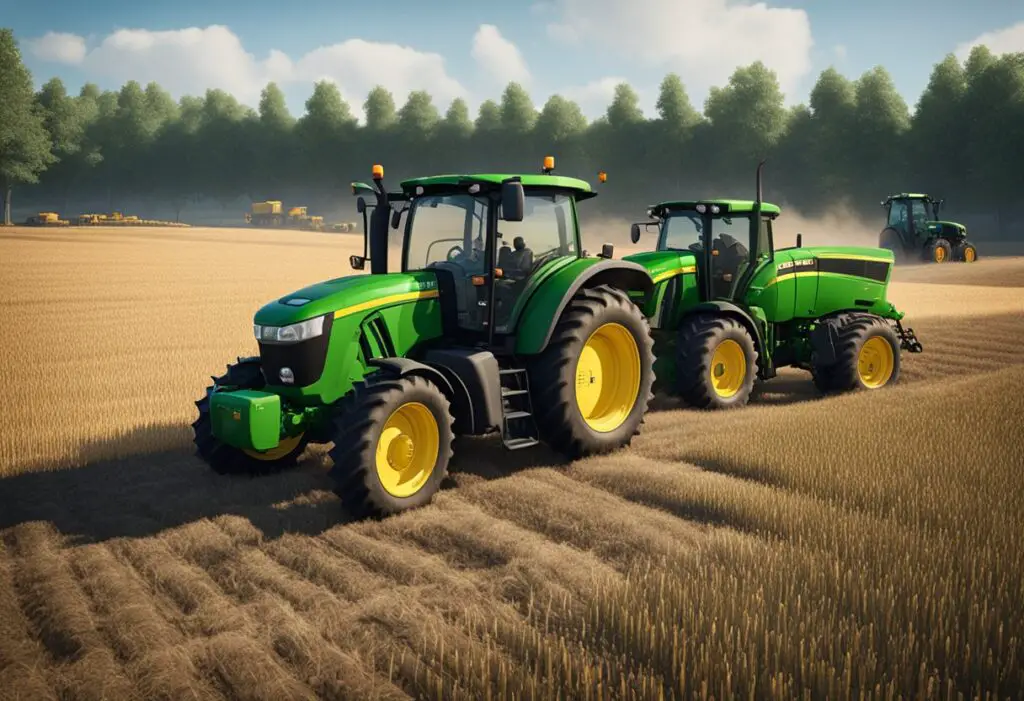
Deciding between Kubota and John Deere requires a careful evaluation of your specific requirements and preferences. From the build quality and design elements to the tractors’ capabilities and the overall ownership experience, there are many factors to think about. Customer feedback, resale value, and service accessibility also play crucial roles in determining which tractor could be the best fit for you. As you weigh your options, consider how these factors align with the type of work you’ll be doing and the level of investment you’re prepared to make.
Key Takeaways
- Comparing Kubota and John Deere involves assessing build quality, tractor capabilities, and customer satisfaction.
- Your unique needs and the nature of your work will heavily influence the choice of tractor brand.
- Ownership experience, including service availability and resale value, is a vital part of the decision-making process.
History and Brand Overview
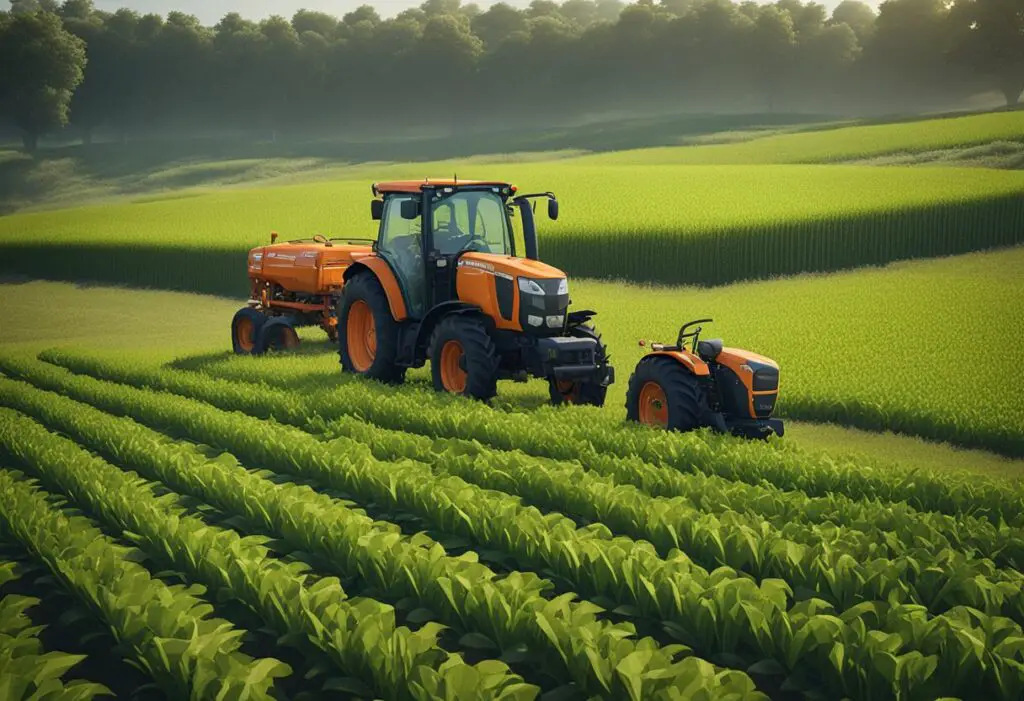
When considering a tractor purchase, you’re likely to encounter two industry giants: Kubota and John Deere. Both have a storied history and offer a range of products that reflect their commitment to quality and innovation.
Kubota Origins
Kubota Corporation began in 1890 in Osaka, Japan. Founded by Gonshiro Kubota, the company initially focused on foundry work before moving into machinery manufacturing. Throughout the 20th century, Kubota expanded its portfolio to include engines, construction machinery, and agricultural equipment. Kubota is now a recognized name worldwide, known for its durable and reliable compact and sub-compact tractors.
John Deere Legacy
John Deere, founded by its namesake in 1837, has its roots in the American Midwest. Deere revolutionized farming with his invention of a polished-steel plow, suited to the Midwest’s challenging soil. The company swiftly became synonymous with agricultural innovation. John Deere has since become an emblematic brand in the United States, producing ranges of large and small machinery, and stands today as a major player in the global agricultural equipment market.
Tractor Lineup and Models
When you’re in the market for a tractor, you have a wealth of options at your fingertips with Kubota and John Deere, each offering a compelling lineup across various power and capability ranges including sub-compact, compact, and utility tractors.
Kubota Tractor Series
Kubota shines with its versatility. Their BX Series is renowned for its sub-compact tractors that combine small frame and powerful performance, perfect for light-duty tasks. Moving up the scale, you’ll find the L Series — a lineup of compact utility tractors that strike a balance between power and convenience. Here’s a glimpse at what you can expect:
Sub-compact: Kubota BX Series
- Models: BX1870, BX2370, BX2670, and more
Compact Utility: Kubota L Series
- Models: L2501, L3301, L3901, L4701, and more
John Deere Tractor Series
John Deere has a storied reputation for manufacturing robust tractors. The 3E Series offers you compact utility tractors designed to handle various agricultural tasks efficiently. Further, models in the 4 Series pack more power and might suit you if you’re aiming for versatile attachments:
- Compact Utility: John Deere 3E Series
- Models: 3025E, 3032E, 3038E
- Higher Power Compact Utility: John Deere 4 Series
- Models: 4044M, 4052M HD, with options like 4WD and Hydrostatic or PowrReverser™ transmissions
Related reads:
– John Deere D Series vs S Series: Your Total Comparison
– John Deere E Series vs G Series: Your Total Comparison
Comparing Model Ranges
You will find that both Kubota and John Deere provide a wide range of models suited to different tasks:
Kubota tractors offer a broad HP range from the lower-end sub-compact at 18 to 33 HP to the more robust compact tractors pushing 25 to 59 HP.
John Deere tractors focus more within the compact segment, with compact tractors ranging from 25 to 43 HP.
Both brands bring you options with hydrostatic transmissions, and in higher-end models, like the John Deere 3R series, a 3-transmission option for increased control. When comparing horsepower, specific models like Kubota’s B2601 boast a slightly higher horsepower at 25.5 HP compared to John Deere’s 2025R, allowing you to match your tractor’s power with your specific tasks.
Performance and Capabilities
When you’re deciding between a Kubota and a John Deere, understanding their performance and capabilities is critical. Each brand showcases strengths in engine efficiency, transmission systems, and attachment options that could sway your decision.
Engine Efficiency and Power
Kubota tractors are renowned for their efficient engines, which deliver reliability and robust performance. Strategically designed for power, these engines meet the diverse needs of various farming operations. On the other hand, John Deere engines are known for their durability and consistent power output, with some models boasting up to 43 HP in the compact tractor range.
Transmission Systems
Kubota offers a standard hydrostatic transmission across many models, which provides simplicity and ease of use, especially for those new to tractor operation. In contrast, John Deere’s 4 Series models allow you the choice of a Hydrostatic or PowrReverser™ transmission. This gives you more flexibility, particularly if you require a mechanical transmission’s responsiveness for certain tasks.
Hydraulics and Attachments
Both brands boast strong hydraulic capabilities, but they differ slightly in their attachment offerings. John Deere tractors have a variety of attachments like plows, cultivators, and planters. Kubota, meanwhile, offers specialized attachments such as backhoes and loaders, enhancing the machine’s versatility.
- John Deere Attachments:
- Plows
- Cultivators
- Planters
- Kubota Attachments:
- Loaders
- Backhoes
- Mower decks
Tractor Power and Horsepower
In terms of tractor horsepower (HP), Kubota spans a broad range from 18 HP in sub-compacts to 59 HP in the compact tractor segment. John Deere focuses on the higher end with compact tractor offerings typically ranging from 25 to 43 HP. Both brands provide sufficient horsepower for various farming and landscaping tasks, ensuring you have the power to tackle the jobs at hand.
Design and Construction Elements
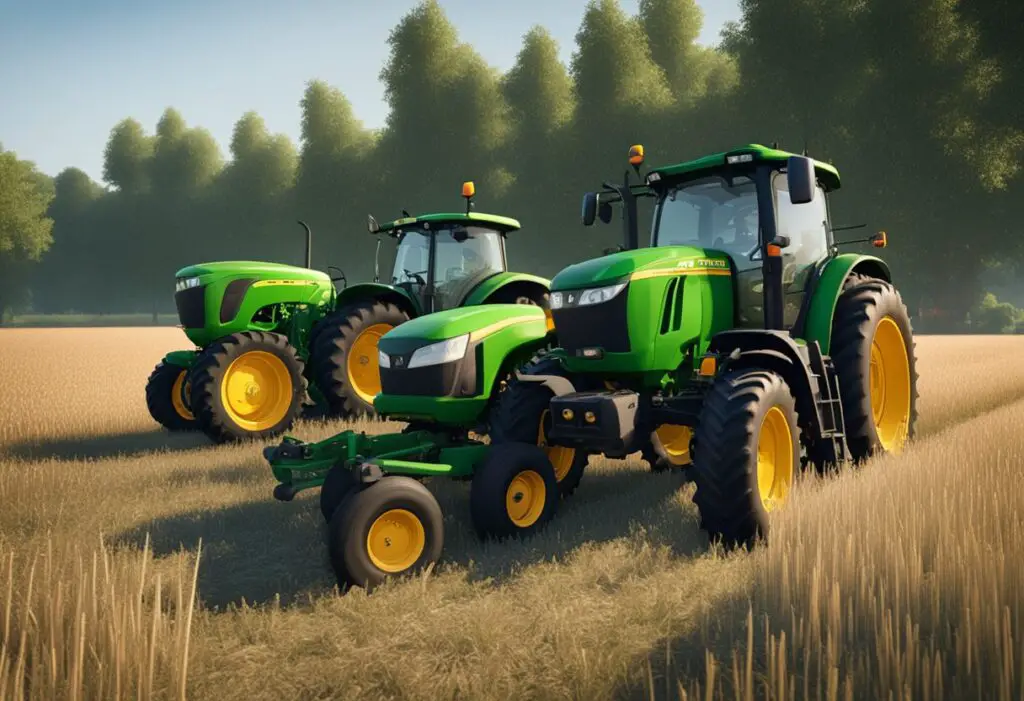
When choosing between Kubota and John Deere, you’ll find that both brands prioritize durability and quality in design and construction. Your tractor needs to withstand various tasks, whether you’re tilling the land or hauling supplies.
Body Construction and Materials
Kubota tractors tend to have sleek exteriors, often featuring glossy finishes and bodies built for longevity. They’re known for using durable steel, ensuring that their construction can stand up to rigorous use. The use of quality materials aids in preventing rust and maintaining the tractor’s integrity over time.
On the other hand, John Deere also emphasizes the use of premium metal in their tractor bodies. While some models may include polymer plastic components, they don’t compromise on building quality, focusing on steel construction that is meant to endure harsh conditions without deteriorating.
Design Features for Convenience
John Deere has integrated design features that aim at providing convenience for you. A standout aspect is the ability for you to add attachments without leaving the cab, optimizing your workflow and saving time.
Kubota’s design includes hands-on control features, like quick curls and raises via the joystick, which may provide you with a more tactile and responsive experience during operation. Both brands have invested in designs that balance durability and practical convenience for day-to-day tasks.
Functionality and Usability
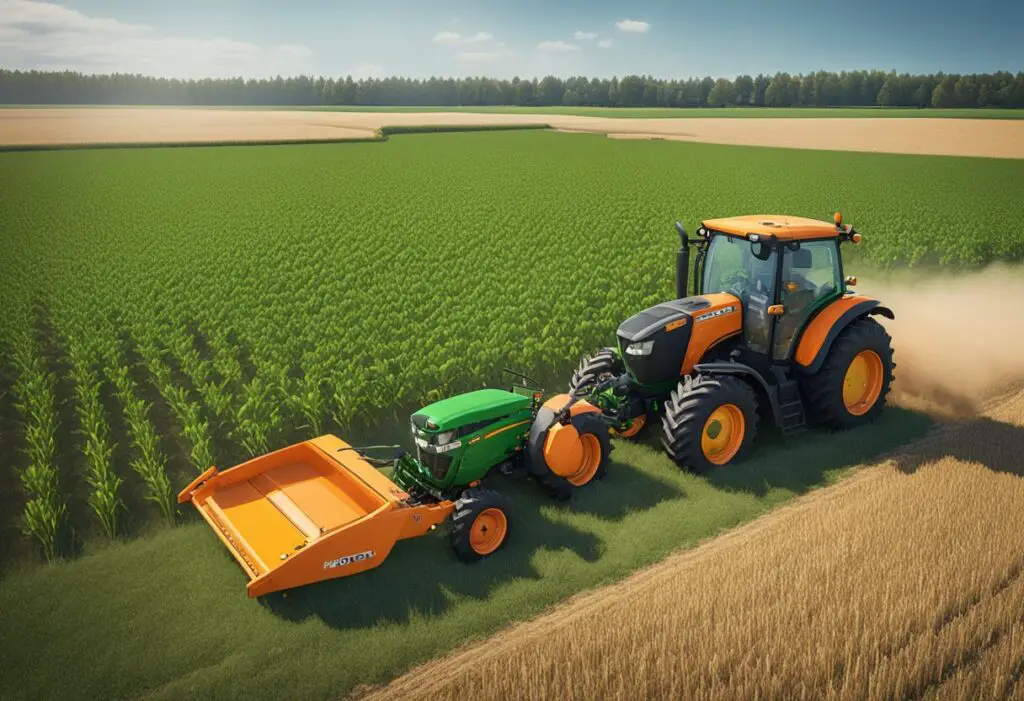
When choosing between Kubota and John Deere, you’ll want to compare how these tractors perform in daily tasks. Focus on the ease with which you can operate the tractor, its adaptability to various tasks, and the effectiveness of its loader controls.
Ease of Operation
Kubota tractors often feature a three-range shift option on their optional HST (Hydrostatic Transmission) systems, allowing for a smoother operation under different workloads. You’ll find that this can make a difference when you require subtle speed adjustments. In contrast, John Deere’s two-range shift on HST models might give you a less nuanced control but can still be adequate for many tasks.
- Steering: Both brands offer power steering, which makes turning and maneuvering more comfortable for you.
- Pedal System: John Deere’s Twin Touch™ foot controls allow you to easily go forward and reverse without a clutch, which makes it particularly user-friendly.
Versatility in Use
When it comes to versatility, the brands differ slightly:
- John Deere: Known for specialized compact tractors, they cater to tasks ranging from lawn care to heavier farm work.
- Kubota: Offers a wide range of sub-compact and compact tractors that can be suited for small-scale farming or landscaping tasks.
Here’s what you need to know for each brand:
- John Deere: Durability and advanced feature sets make these tractors versatile for larger scale operations.
- Kubota: Compactness and maneuverability are key for their versatility in small-scale applications.
Loader Operation and Control
Loader operation is pivotal in a tractor’s usability. You’ll notice some differences in how Kubota and John Deere approach this:
- Joystick Controls: Kubota’s joystick controls for the loader are intuitive, allowing for quick curls and raises that augment their tractors’ ease of use.
- Quick Park Loader: John Deere’s Quick Park™ system lets you attach or detach loaders efficiently, without the need to leave the cab, providing convenience and time efficiency.
Here’s a quick comparison:
| Feature | Kubota | John Deere |
|---|---|---|
| Transmission Options | Three-range HST | Two-range HST |
| Operability | Intuitive joystick controls | Twin Touch™ pedals for easy direction changes |
| Loader Attachment | Hands-on loader control | Quick Park™ system for ease of attachment |
| Best For | Small-scale farming/landscaping | Versatile applications in larger operations |
Remember, both brands have their strengths, so your choice should come down to which tractor’s functionality and usability align best with your specific needs.
Ownership Experience
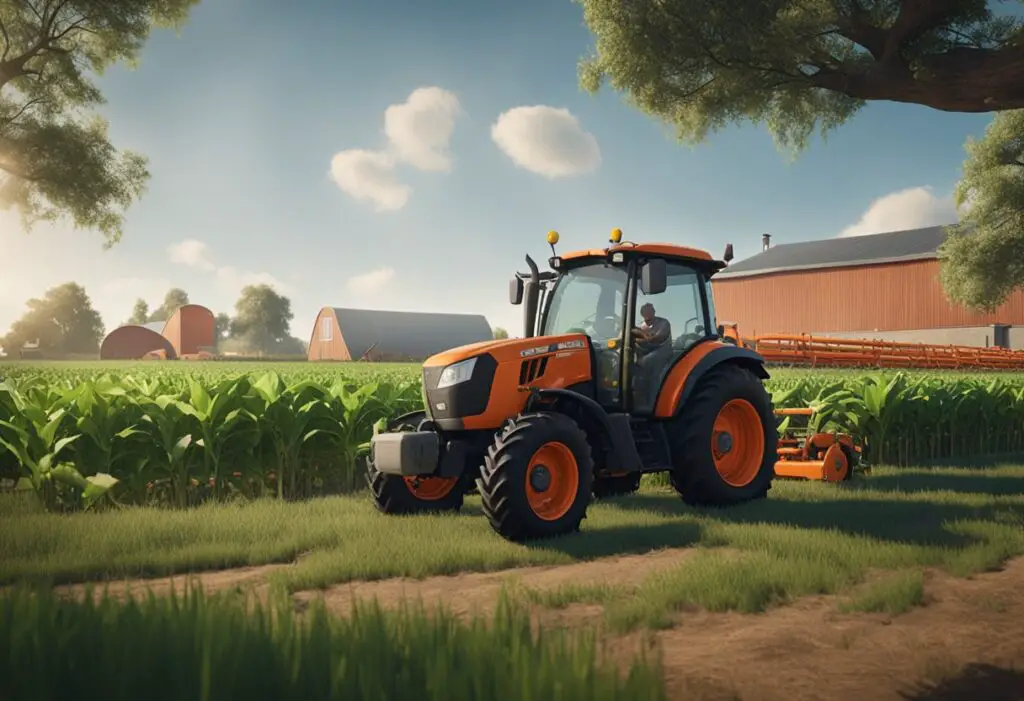
When comparing Kubota and John Deere, you’ll notice that ownership experience extends beyond just the purchase of a tractor. It involves after-sale service and support, warranty and parts availability, and the overall cost of ownership, which includes price, value, and resale value.
Service and Support
When you purchase a tractor, dealer support can be a make-or-break factor. With John Deere, you might experience faster turnaround times for service, an aspect that can diminish downtime during crucial working periods. Kubota also provides reliable support, with a network of dealers committed to customer satisfaction. In terms of financing options, both brands offer competitive plans, ensuring you can manage your purchase effectively.
Warranty and Parts
Both John Deere and Kubota are known for their robust warranty offers. John Deere typically offers a 2-year/2,000-hour warranty, giving you peace of mind with your investment. Kubota’s warranty often varies but usually includes a similar range of coverage. When it comes to parts availability, each brand has a strong supply network, ensuring that you can get the parts you need when you need them.
- John Deere: 2-year/2,000-hour warranty (which may vary for specific models)
- Kubota: Varies, comparable coverage (confirm with your dealer for model specifics)
Cost of Ownership
The price at purchase is just the beginning. You have to consider maintenance costs, resale value, and the overall value you get from the tractor. Kubota tends to offer a wide power range across its models, which may lead to better match for specific needs and potentially lower costs if a less powerful model suffices. John Deere tractors often hold their resale value well, which can be a significant factor if you plan to upgrade in the future.
- Initial Price: Potentially higher for John Deere but varies by model and specifications
- Maintenance Costs: Comparable, with slight differences in routine service prices
- Resale Value: Strong for John Deere; data for Kubota varies by model and market conditions
Industry Applications
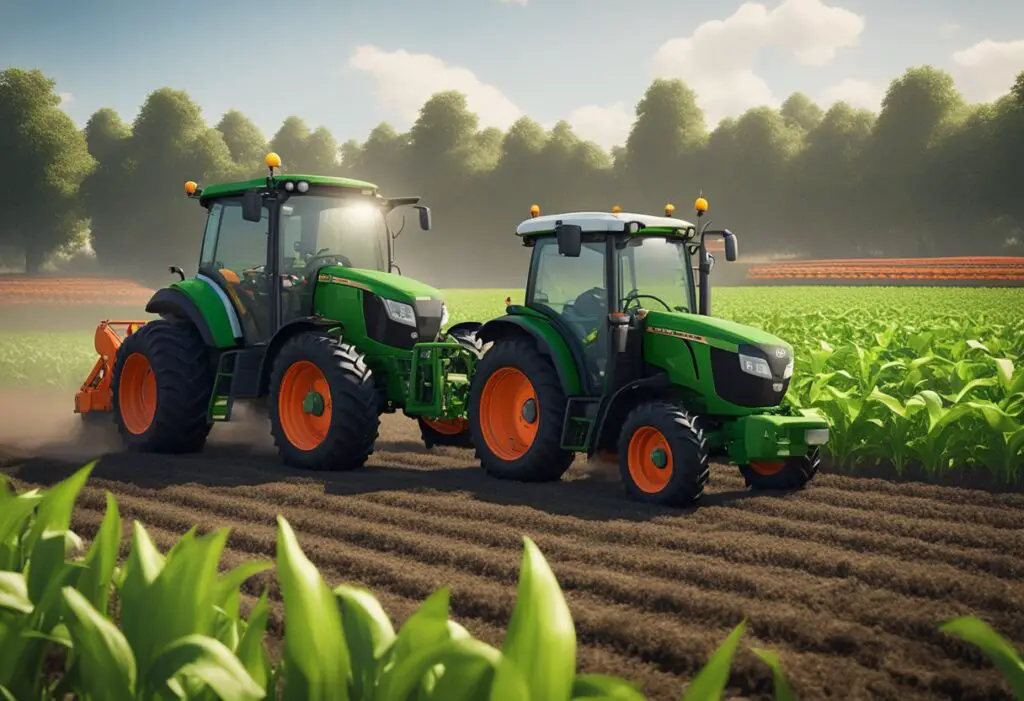
When choosing between Kubota and John Deere, your specific industry applications—be it farming, landscaping, or construction—play a crucial role in determining the best fit for your property needs.
Agricultural Use
In the realm of farming, John Deere is often the go-to for many farmers, offering a suite of farm equipment that excels in both durability and versatility. Their tractors are designed to perform for various agricultural operations, thanks to:
- Advanced features for large-scale farming
- A range of attachments including plows, cultivators, and planters
Kubota, while also providing solutions for farming, may be a strong contender, especially when you are looking for tractors that are:
- Efficient in fuel consumption with powerful engines
- Favorable for small to mid-size property management
Landscaping and Construction
If your focus is on landscaping or construction, you’re looking for equipment that offers maneuverability and can handle diverse tasks.
For landscaping, Kubota tractors shine with their:
- Compact design perfect for maneuvering in tight spaces
- Varied attachments like loaders and mower decks aimed at landscapers
On the other side, John Deere brings to the table:
- Reliability and the ability to adapt to multiple job sites
- Strong plastic polymers in construction that promise longevity, despite being less traditional than metal
By aligning your needs with the strengths of each brand, you ensure your investment supports your long-term success in whichever industry application you specialize in.
Buying Considerations
When choosing between John Deere and Kubota, it’s important to consider your budget, how long you’d like the tractor to last, and what each brand offers. Let’s explore these aspects to ensure you make an informed decision.
Analyzing Cost and Budget
Your budget plays a pivotal role in the decision-making process. John Deere tractors are often recognized for their durability and may command a higher price. For instance, the John Deere 5045 D Power Pro is tagged around $55,778, offering a balance of power and efficiency—a substantial investment.
Kubota, on the other hand, ranges widely in horsepower and corresponding costs, allowing you to select a model that aligns with your financial constraints. Be thorough in comparing the prices and what you get for them, such as horsepower, lifting capacity, and other included features.
Longevity and Resale Value
Investing in a tractor is not just about the initial cost; it’s about how long it serves you—its longevity—and the resale value you can expect. Although both brands are reputed for their longevity, it’s worth noting that John Deere machines often retain value due to brand recognition. Evaluating the resale value can provide an indication of the tractor’s durability and market demand.
Strengths and Weaknesses Comparison
Both John Deere and Kubota have their unique strengths and weaknesses; thus, a comparison can help cater to your specific needs. John Deere tractors, for example, offer a Power Pro series that is capable of handling both wet and dry lands effectively, making them versatile in different farming conditions.
Kubota boasts a broader range of horsepower options from 18 to 59 HP, which might benefit you if you have varying intensity tasks. Before the purchase, consider listing the pros and cons related to power, capabilities, and additional features like transmission types and cabin enclosures.
Customer Experiences and Feedback
When you’re considering a major investment like a tractor, firsthand experiences from current owners can be invaluable. Below, you’ll find insights on what people are saying about Kubota and John Deere, as well as how these brands stack up in after-sale support.
Testimonials and Reviews
Customers often highlight reliability and durability in their reviews. Here’s a quick breakdown:
- Kubota: You might find many reviews praising their horsepower and ease of use, especially with the B2601 model’s hydrostatic transmission.
- John Deere: Expect to read about satisfaction with the 4 Series tractors’ performance, as well as customer contentment thanks to their powerful engines and transmission options like the Hydrostatic or PowrReverser™.
| Brand | Highlighted Features | Frequency of Positive Reviews |
|---|---|---|
| Kubota | Larger size, better-speed hydrostatic transmission | Common mentions |
| John Deere | 4WD across the 4 Series, transmission choices | Regular praises |
After-Sale Customer Support
Kubota and John Deere both provide after-sale support, but the level of customer satisfaction may vary:
- Kubota: They offer a diverse range of support for both sub-compact and compact tractors, which can be a significant factor in your long-term satisfaction.
- John Deere: The brand is often recognized not just for their machinery but also for excellent after-sale support. You might read about owners who value the reliable service and prompt responses from John Deere’s customer support team.
Keep in mind:
- Availability of parts and service centers
- Responsiveness to customer inquiries and issues
- Comprehensive service plans and warranty options
Remember, choosing a brand is not just about the machine, but also about the ongoing support you’ll receive after your purchase.
Frequently Asked Questions
When considering tractor and mower purchases, you likely have questions regarding value, performance, specs, durability, and the intricacies of different models. The following responses aim to clarify these points for you regarding Kubota and John Deere products.
Which brand offers better value for money in their tractor models?
Kubota tractors are recognized for their powerful and efficient engines, and often come with a variety of attachments like backhoes and loaders. John Deere tractors are noted for their robust designs and a wider range of accessories, which may influence their value proposition.
How do the sub-compact tractors from Kubota and John Deere compare in performance?
Kubota provides options ranging from 18 to 33 HP in their sub-compact tractors, indicating a focus on versatility and utility. John Deere’s sub-compact tractors, while typically offering power from 25 to 43 HP, focus on performance in a more narrowed segment.
What are the common differences in specs between Kubota and John Deere tractors?
Specs between the two brands can vary; John Deere’s lineup may offer a higher horsepower range in certain models, whereas Kubota models might prioritize efficient fuel consumption and powerful engines.
In terms of durability and reliability, which tractor brand is preferred by consumers?
Both brands have strong reputations for durability and reliability. Preferences can be subjective and often depend on individual experiences, as well as the specific series and model of tractor.
How do Kubota and John Deere zero-turn mowers stack up against each other?
Kubota’s zero-turn mowers offer engines up to 30.8 horsepower, and John Deere mowers range up to 37.4 horsepower. Both are designed for heavy workloads with excellent traction and stability, making your choice a matter of personal requirement and brand affinity.
When choosing a skid steer, what should be considered between Kubota and John Deere?
You should consider factors such as lifting capacity, horsepower, and the available attachments. Always evaluate your specific needs for the machinery and how each brand’s offerings align with those requirements.
Last updated on September 6, 2025
